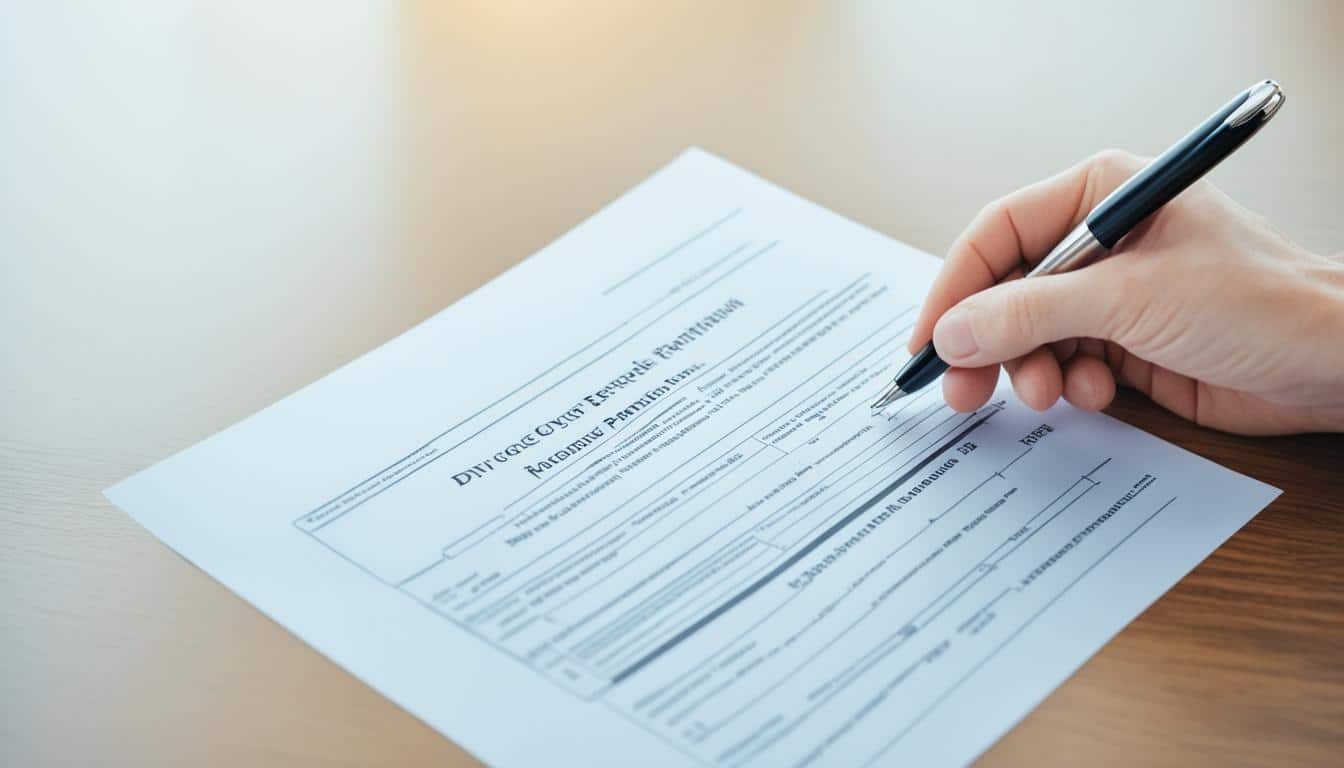Physical Address
304 North Cardinal St.
Dorchester Center, MA 02124
Physical Address
304 North Cardinal St.
Dorchester Center, MA 02124

Filing for divorce in Bulloch County, GA, might seem daunting, but it’s a step many take towards a new chapter in life. Whether it’s the quest for personal growth or the need for a fresh start, understanding the process is key.
Bulloch County, like the rest of Georgia, has its own set of procedures to follow. From gathering the necessary documents to understanding legal grounds, it’s all about taking it one step at a time. But where do you start? And what should you expect along the way?

This guide aims to simplify the legal jargon and lay out the steps in plain English. Ready to turn the page? Keep reading as we walk you through the essentials of filing for divorce in Bulloch County, ensuring you’re prepared for the journey ahead.
To get more info on filing for divorce in Georgia, find a detailed overview in our article, How to File for Divorce in Georgia.
In order to file for divorce in Bulloch County, Georgia, there are certain eligibility requirements that must be met. One of the key requirements is residency. You or your spouse must have established residency in Bulloch County for a specific period of time before you can file for divorce.
The residency requirements for filing for divorce in Bulloch County GA are as follows:
Establishing residency in Bulloch County requires demonstrating that you have made the county your primary place of residence. This can be done by providing documents such as utility bills, rental agreements, or driver’s licenses that show your Bulloch County address.
Meeting the residency requirements is a crucial step in the divorce process. It is important to consult with an experienced divorce attorney or refer to the Bulloch County GA courthouse to ensure that you meet all the necessary eligibility criteria before filing for divorce.
| Residency Requirements for Divorce in Bulloch County GA |
|---|
| You or your spouse must have been a resident of Bulloch County for at least six months prior to filing for divorce. |
| If you and your spouse live in different counties in Georgia, the divorce must be filed in the county where the defendant resides. |
When filing for divorce in Bulloch County, Georgia, it is important to understand the grounds for divorce that are recognized by the court. These grounds determine the reasons for which a divorce can be granted. In Bulloch County, divorce grounds can be classified as either no-fault or fault-based. Let’s take a closer look at each type of divorce.
A no-fault divorce is based on the irretrievable breakdown of the marriage. It does not require showing that one spouse is at fault for the break-up. Common grounds for a no-fault divorce in Bulloch County include:
When filing for a no-fault divorce, it’s important to note that both parties must agree to the divorce and sign the necessary documents.
In contrast, a fault-based divorce in Bulloch County requires proving that one spouse is at fault for the dissolution of the marriage. The following are some grounds for a fault-based divorce:
To file for a fault-based divorce, specific evidence must be provided to support the claims made against the other spouse.
Understanding the grounds for divorce in Bulloch County is essential for navigating the divorce process. Whether you are pursuing a no-fault or fault-based divorce, it is advisable to consult with a Bulloch County GA divorce attorney to ensure that your rights are protected and that the appropriate legal procedures are followed.
Filing for divorce in Bulloch County, Georgia involves a series of steps and the completion of various forms. By following this guide, you will learn the process from start to finish, ensuring you have all the necessary information to file for divorce successfully.
Step 1: Gather the necessary documents
Before you begin the filing process, you will need to gather important documents. These may include:
Having these documents readily available will speed up the filing process.
Step 2: Complete the required forms
In Bulloch County, GA, there are specific forms you must complete to file for divorce. These forms vary depending on whether you are filing a contested or uncontested divorce. You will typically need to complete forms related to:
These forms can be obtained from the Bulloch County Court or online through the Georgia Judicial Branch website.
Step 3: Submit the paperwork
Once you have completed the necessary forms, you will need to submit them to the appropriate court. In Bulloch County, divorce filings are handled by the Bulloch County Superior Court. Ensure that all forms are filled out accurately and signed before submission.
Step 4: Pay the filing fee
When filing for divorce in Bulloch County, there is generally a filing fee that must be paid. The amount may vary, so it’s essential to check the current fee with the Bulloch County Superior Court. If you are unable to afford the fee, there may be options for a fee waiver or installment payments. Check with the court for more information.
After you have filed the necessary paperwork, you will need to serve the documents to your spouse. This means providing them with copies of the filed forms. There are specific rules and procedures for serving documents in Bulloch County, so it’s advisable to consult with an attorney or the court clerk for guidance.
Step 6: Attend court hearings
Depending on the specific circumstances of your divorce, you may be required to attend court hearings. These hearings will address issues such as child support, alimony, and division of assets. It’s crucial to be prepared and present at all scheduled court appearances.
By following these steps, you can navigate the process of filing for divorce in Bulloch County, Georgia. Remember, divorce proceedings can vary depending on individual circumstances, so it’s recommended to consult with a qualified attorney to ensure your rights are protected.
Filing for divorce in Bulloch County, Georgia involves various costs, including filing fees. It is important to understand the financial aspect of the divorce process to properly plan and budget. In this section, we will provide information on the filing fees for divorce in Bulloch County, Georgia, as well as any additional costs that may be associated with the process.
When filing for divorce in Bulloch County, Georgia, you will be required to pay filing fees to the court. These fees cover the administrative costs of processing your divorce case. It is essential to be aware of the current filing fees to ensure you can meet the financial obligations associated with your divorce.
To obtain detailed and accurate information on the filing fees for divorce in Bulloch County, Georgia, you can visit the official website of the Bulloch County Superior Court. The court’s website will provide up-to-date information on the fees applicable to divorce cases in the county.
| Description | Average Fee | Additional Information |
|---|---|---|
| Carroll County District Clerk Filing Fees | Around $300 | Fee can vary based on case complexity, presence of children, and name changes. |
| Additional Fee if Sheriff’s Office Service is Necessary | $50.00 | No personal checks accepted. |
In addition to the filing fees, there may be other costs associated with the divorce process. These costs can include fees for serving divorce papers to your spouse, fees for copies of court documents, and fees for any required mediation or counseling sessions. It is important to take these potential additional costs into account when planning for your divorce.
Understanding the filing fees and additional costs associated with filing for divorce in Bulloch County, Georgia, is crucial to ensure you are prepared and can navigate the process effectively. By being aware of the financial obligations, you can plan ahead and make informed decisions about your divorce.
For individuals who are unable to afford the filing fees for divorce in Bulloch County, Georgia, there may be options for a fee waiver. A fee waiver allows eligible individuals to waive the cost of filing for divorce, alleviating the financial burden they may face during the divorce process. By understanding the criteria for eligibility and the process of obtaining a fee waiver, you can explore this option if you are facing financial constraints.
If you are considering a fee waiver for your divorce in Bulloch County, it’s important to understand the eligibility requirements. The criteria for a fee waiver may vary depending on the specific circumstances of your case and your financial situation. Some common factors that could make you eligible for a fee waiver include:
Once you determine your eligibility for a fee waiver, you will need to follow the specific process outlined by the Bulloch County court. This may involve completing an application or affidavit, providing supporting documentation to demonstrate your eligibility, and submitting it to the court for review. It’s important to carefully follow the instructions provided by the court and provide accurate information to avoid any delays in the processing of your fee waiver request.
By exploring the option of a fee waiver, you can potentially alleviate the financial burden of filing for divorce in Bulloch County. If you believe you may be eligible for a fee waiver, it’s recommended to consult with a legal professional or contact the Bulloch County court for more information on the specific eligibility criteria and process for obtaining a fee waiver.
| Eligibility Criteria | Description |
|---|---|
| Low income | Your income falls below the specified threshold. |
| Public assistance | You are receiving certain forms of public assistance, such as Medicaid, SNAP, or TANF. |
| Financial hardship | Paying the filing fees would cause a significant financial hardship, which may include unemployment, medical expenses, or other financial obligations. |
The court is located at:
20 Siebald St, Statesboro, GA 30458, United States
Whether you need to submit paperwork, attend hearings, or seek information, visiting the Bulloch County Courthouse is an important step in the divorce process. It is recommended to contact the court in advance to confirm any specific requirements or procedures.
If you’re considering filing for divorce in Bulloch County, Georgia, but don’t want or can’t afford to hire an attorney, you have the option to proceed with a pro se divorce. Filing for divorce without legal representation may seem daunting, but with the right guidance and resources, you can navigate the process successfully.
Before you embark on a pro se divorce, it’s crucial to familiarize yourself with the necessary steps involved. Begin by gathering all the required paperwork, including the divorce forms specific to Bulloch County. These forms are available online or at the Bulloch County courthouse.
Once you have the necessary forms, you will need to complete them accurately and thoroughly. Pay close attention to the instructions and guidelines provided with the forms to ensure you include all the required information. Mistakes or omissions can cause delays or complications in your divorce proceedings.
Additionally, it’s essential to educate yourself about the divorce laws and procedures in Bulloch County. Understanding the local regulations will help you navigate the legal system more effectively. Consider seeking guidance from self-help resources, such as legal clinics or online guides, that provide information specific to pro se divorce in Bulloch County.
To see how this process of filing for divorce in Bulloch County compares to that in other Georgia counties, check out our articles about how to file for divorce in Bibb County and filing for divorce in Camden County.